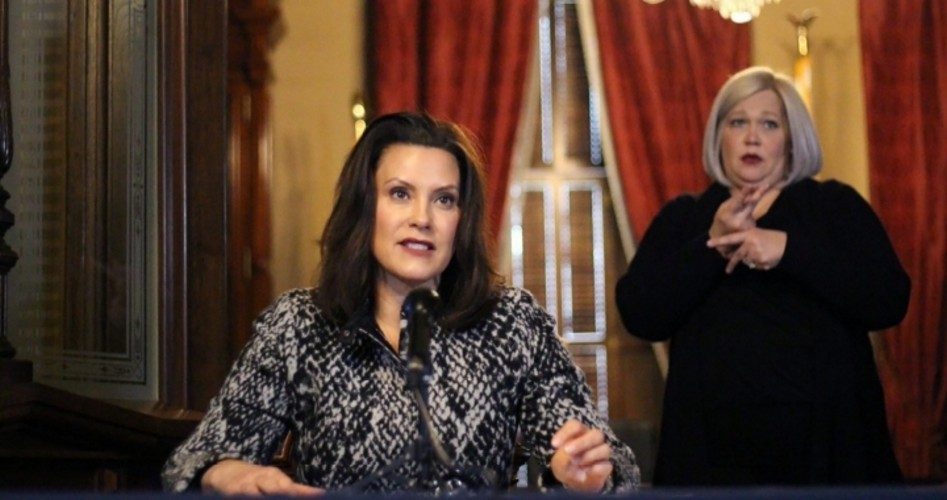
Michigan Governor Gretchen Whitmer recently issued some pro-liberty “clarifications” to her coronavirus executive orders thanks to the efforts of two nonprofit legal organizations.
On April 2, Whitmer issued an executive order terminating the school year across the state. Section I, paragraph A, of the order says, “In-person instruction for pupils in kindergarten through grade 12 … is suspended for the remainder of the 2019-2020 school year.” It further states that the order “applies to all public, nonpublic, and boarding schools in the state.”
Since homeschools are considered nonpublic schools under Michigan law, the order would appear to have prohibited homeschooling as well as institutional schooling — a major issue in a state whose schools are closed and whose homeschooling laws are among the most lenient in the nation.
The Great Lakes Justice Center (GLJC), a nonprofit law firm, brought the matter to Whitmer’s attention.
“I think this is sloppy drafting of the order and an unintended consequence. I don’t think she meant to outlaw homeschooling,” GLJC attorney David Kallman told CBN News. “But the language is there. We called on the governor to clarify and correct this error.”
While Whitmer, a far-left Democrat who was endorsed by the Michigan Education Association, is hardly a fan of homeschooling, she nevertheless issued a clarification document Monday that specifically states that her order does not prohibit homeschooling. The document also says that schools can resume in-person classes if the COVID-19 state of emergency ends before the school year does; it is currently scheduled to end on April 30.
“This is exactly what we asked her to clarify, so we are pleased with her response,” said Kallman.
Whitmer also had to clarify her March 23 order, which she extended and expanded on Friday, because it was being used to prohibit peaceful pro-life demonstrators from continuing to appear outside abortion clinics even as it permitted other outdoor activities.
The order closed “nonessential” businesses and health services — but not abortion clinics — and told Michiganders to stay home unless engaging in “essential” activities. It did, however, make an exception for people engaging in “recreational activity” outdoors as long as they practiced social distancing.
On March 31, pro-life activist Andrew Belanger, who was maintaining his distance from others while standing outside a Detroit abortion clinic, was approached by 15 city police officers in eight vehicles. According to the American Freedom Law Center (AFLC), the public-interest law firm that took up Belanger’s case, after other pro-life activists arrived to witness the incident, “the officers told the pro-lifers that while abortion was ‘essential’ under the governor’s order and thus permitted, the pro-lifers’ First Amendment activity was not ‘essential’ and thus unlawful.”
“The officers proceeded to issue Belanger a ‘State of Michigan Uniform Law Citation’ for violating the Executive Order — a misdemeanor offense,” added AFLC. “The law violation described in the citation is ‘emergency powers of governor.’ The offense was described as ‘Subject refusing to leave, protesting outside while shutdown is in effect.’”
The AFLC filed a federal lawsuit against Whitmer, arguing that prohibiting outdoor activities protected by the First Amendment is unconstitutional. AFLC also sought an emergency order enjoining police from enforcing Whitmer’s order against pro-lifers while the case was in progress.
On April 2, U.S. District Judge Janet Neff denied the motion for an emergency order.
On April 7, Whitmer clarified her order thus: “Persons may engage in expressive activities protected by the First Amendment within the State of Michigan, but must adhere to social distancing measures recommended by the Centers for Disease Control and Prevention, including remaining at least six feet from people from outside the person’s household.”
Given that clarification, Neff signed an order Tuesday that, according to AFLC, “(1) protects the pro-lifers’ First Amendment rights from infringement by the governor’s executive orders and (2) dismisses the criminal citation against … Belanger.”
Michiganders have thus reclaimed some of their God-given liberties. But the fact that they had to force the issue, in one case even going to court, and that Whitmer’s orders seem to need constant clarification to resolve supposedly unintended consequences — the Republican-controlled legislature had to pressure her into exempting churches from shelter-in-place — suggests that the orders are either poorly drafted or deliberate attempts to subvert the Constitution.
Photo: AP Images
Michael Tennant is a freelance writer and regular contributor to The New American.



